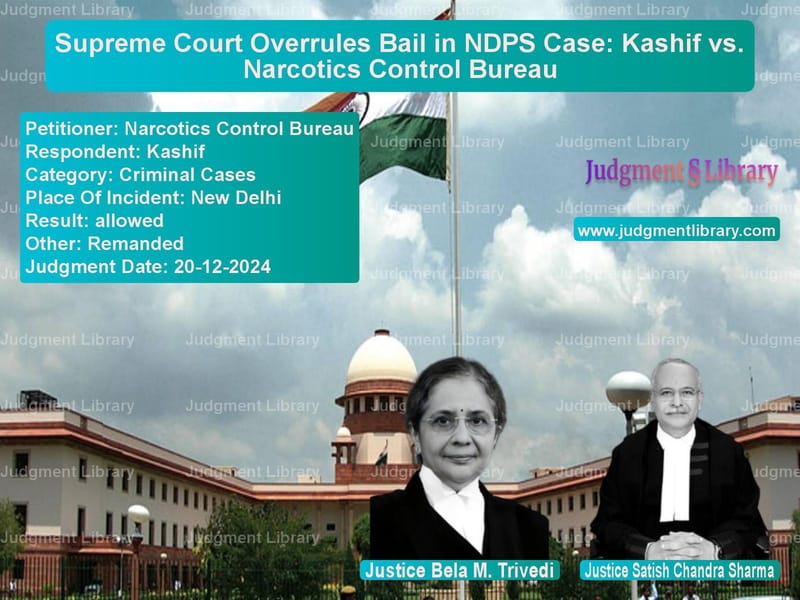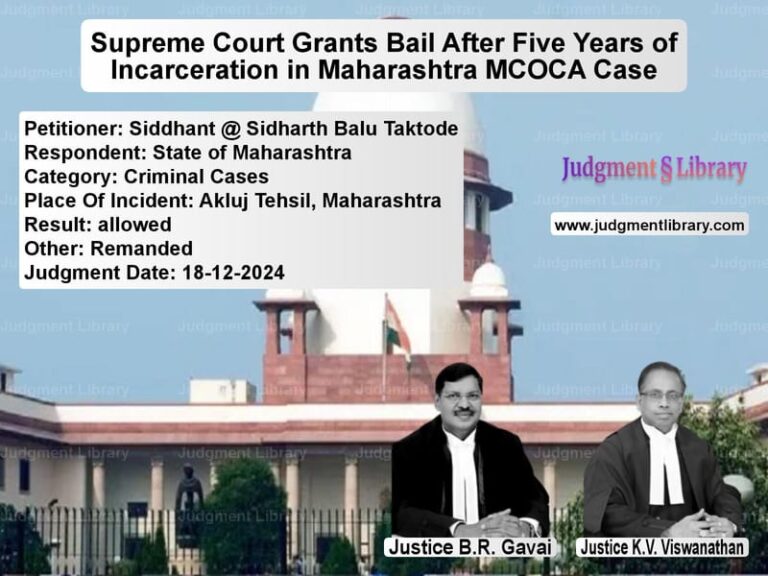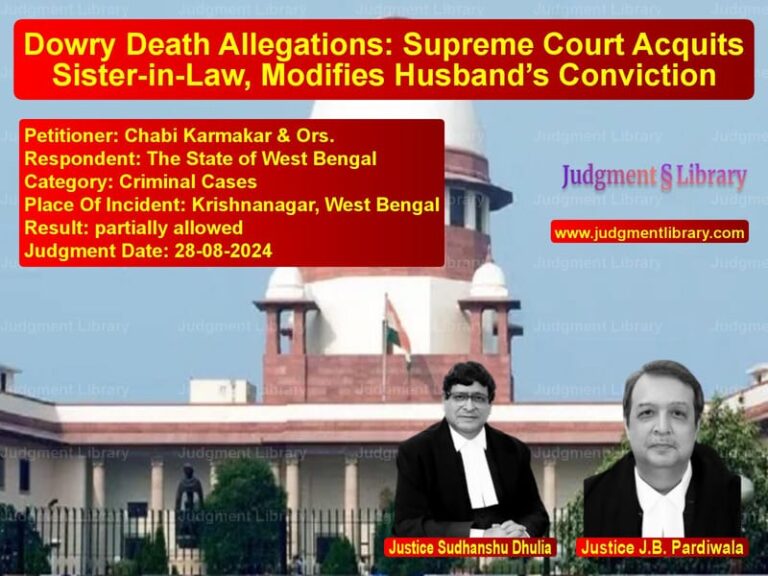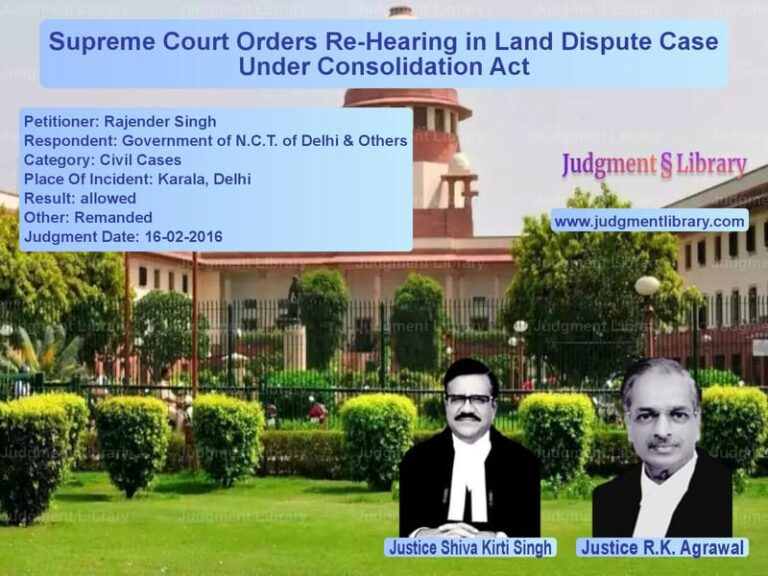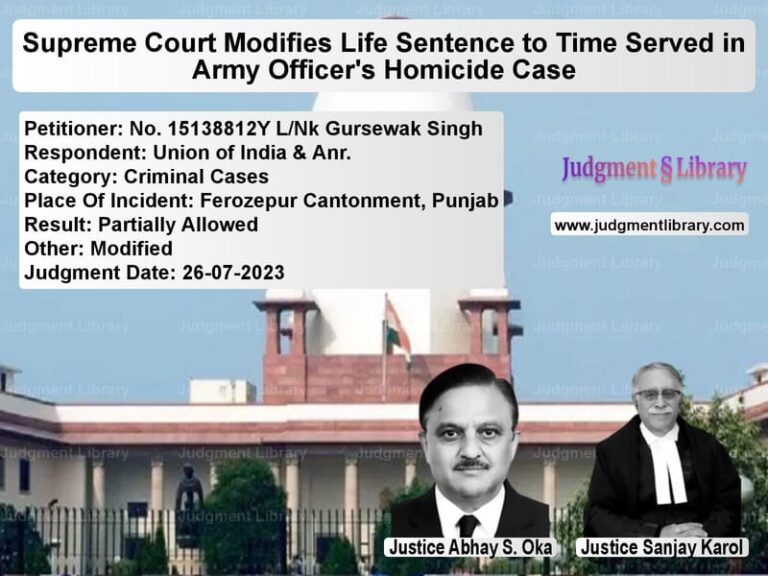Supreme Court Overrules Bail in NDPS Case: Kashif vs. Narcotics Control Bureau
The Supreme Court of India has delivered a crucial judgment in the case of Narcotics Control Bureau vs. Kashif, overturning the Delhi High Court’s decision to grant bail to the accused in a major narcotics case. This case, concerning drug smuggling and the interpretation of Section 52A of the Narcotic Drugs and Psychotropic Substances Act, 1985 (NDPS Act), highlights the stringent legal framework for handling narcotics offenses in India.
Case Background
The case originated on February 24, 2022, when the Narcotics Control Bureau (NCB) received intelligence about a suspicious parcel at DHL Express, Kirti Nagar, New Delhi. Upon investigation, officials found 13,200 strips of Tramadol tablets concealed in lace rolls. This led to further investigations, resulting in the seizure of:
- 15,000 Zolpidem tablets from a consignment at IGI Airport.
- 19,440 Tramadol tablets from a courier facility linked to co-accused Tamir Ali.
Based on these seizures, the authorities arrested multiple individuals, including Kashif, on March 7, 2022. The prosecution argued that Kashif was a key player in smuggling operations, facilitating the transport of narcotics through various courier networks.
Charges Against Kashif
The NCB charged Kashif under the following sections of the NDPS Act:
- Section 8: Prohibition of certain activities relating to narcotic drugs and psychotropic substances.
- Section 22(c): Punishment for possession, purchase, or use of commercial quantities of psychotropic substances.
- Section 23(c): Illegal import/export of narcotic drugs and psychotropic substances.
- Section 29: Punishment for conspiracy and abetment related to narcotics offenses.
The NCB’s investigation revealed that Kashif and his associates were using organized smuggling networks to ship large quantities of narcotic substances to various international locations, primarily the United States.
High Court’s Decision
The Delhi High Court granted bail to Kashif on May 18, 2023, citing alleged non-compliance with Section 52A of the NDPS Act. The court observed that:
- The prosecution failed to comply with the required sampling procedures within a reasonable time.
- The delay in sampling and certification raised concerns about potential tampering with evidence.
- Since the samples were not collected in strict adherence to the procedural mandate, the accused was entitled to the benefit of the doubt.
Based on these findings, the High Court ruled in favor of granting bail to Kashif, concluding that the procedural irregularities weakened the prosecution’s case.
Supreme Court’s Examination
The Supreme Court, however, took a different view. The court emphasized the importance of strict compliance with Section 37 of the NDPS Act, which sets stringent conditions for granting bail in narcotics cases. The bench, led by Justices Bela M. Trivedi and Satish Chandra Sharma, held that:
“The High Court has failed to consider the mandatory requirements of Section 37. Granting bail in a case involving commercial quantities of narcotics, without adhering to statutory safeguards, is legally unsustainable.”
The Supreme Court further observed:
- Bail should be granted only if the court is satisfied that the accused is not guilty and not likely to commit an offense while on bail.
- The High Court’s reliance on procedural lapses ignored substantial evidence collected during the investigation.
- The integrity of the seized contraband was supported by independent forensic reports.
- Section 52A’s procedural requirements pertain to the disposal of seized substances, not their admissibility as primary evidence.
Key Legal Observations
The Supreme Court clarified several important legal principles in this case:
1. Bail in NDPS Cases Is an Exception, Not the Rule
Under Section 37 of the NDPS Act, bail cannot be granted unless two cumulative conditions are met:
- There are reasonable grounds to believe that the accused is not guilty.
- The accused is not likely to commit further offenses while on bail.
The Supreme Court held that the High Court had failed to assess these conditions before granting bail.
2. Procedural Lapses Do Not Nullify the Case
The court noted that minor procedural lapses, such as delays in applying for certification under Section 52A, do not automatically render the prosecution’s case void. It observed:
“The purpose of Section 52A is to facilitate the disposal of seized contraband, not to provide an escape route for offenders.”
Accordingly, the evidence collected—such as seizure memos, forensic reports, and eyewitness testimonies—remained valid and admissible.
3. The High Court Ignored Key Forensic Evidence
The prosecution had submitted independent forensic analysis confirming the nature of the seized substances. The Supreme Court criticized the High Court for disregarding this evidence and focusing solely on procedural timelines.
Final Judgment
The Supreme Court ruled:
- The High Court’s order granting bail was quashed.
- The case was remanded for fresh consideration.
- The bail application must be reviewed strictly in accordance with Section 37 of the NDPS Act.
- The High Court must conclude the review process within four weeks.
The Supreme Court also directed the Delhi High Court to assign the bail review to a different bench to ensure an impartial re-evaluation.
Implications of the Judgment
This ruling has significant implications for future narcotics cases in India:
- Reinforcement of NDPS Bail Restrictions: The verdict affirms that bail in serious drug offenses must be granted only in rare and exceptional cases.
- Emphasis on Substantive Evidence: The judgment underscores that minor procedural lapses should not overshadow material evidence in drug cases.
- Clarification on Section 52A: The ruling clarifies that Section 52A pertains to the disposal of narcotics and does not affect the admissibility of primary evidence.
- Strengthened Drug Law Enforcement: The verdict empowers law enforcement agencies by affirming that technicalities should not obstruct justice in narcotics cases.
Conclusion
The Supreme Court’s ruling in Narcotics Control Bureau vs. Kashif sets a landmark precedent in NDPS jurisprudence. By overturning the bail granted on procedural grounds, the judgment reinforces the strict legal standards governing drug-related offenses. The case will now return to the High Court for reconsideration, ensuring that bail decisions align with statutory mandates and the broader objective of curbing narcotics trafficking.
Petitioner Name: Narcotics Control Bureau.Respondent Name: Kashif.Judgment By: Justice Bela M. Trivedi, Justice Satish Chandra Sharma.Place Of Incident: New Delhi.Judgment Date: 20-12-2024.
Don’t miss out on the full details! Download the complete judgment in PDF format below and gain valuable insights instantly!
Download Judgment: narcotics-control-bu-vs-kashif-supreme-court-of-india-judgment-dated-20-12-2024.pdf
Directly Download Judgment: Directly download this Judgment
See all petitions in Drug Possession Cases
See all petitions in Bail and Anticipatory Bail
See all petitions in Fraud and Forgery
See all petitions in Judgment by Bela M. Trivedi
See all petitions in Judgment by Satish Chandra Sharma
See all petitions in allowed
See all petitions in Remanded
See all petitions in supreme court of India judgments December 2024
See all petitions in 2024 judgments
See all posts in Criminal Cases Category
See all allowed petitions in Criminal Cases Category
See all Dismissed petitions in Criminal Cases Category
See all partially allowed petitions in Criminal Cases Category

